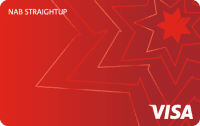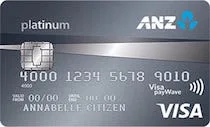American Express or Afterpay? Zero interest or Zip? Both credit cards and buy now pay later services give you a way to shop for what you want, then pay off your purchases over time. But there are a lot of differences between these two options.
For starters, most credit cards charge interest when you have a balance (unless you have a no interest monthly fee card). And most buy now pay later services have fixed payment instalments, with late fees if you can't make them on time. These examples are really just the tip of the iceberg, so let's take a closer look at how credit cards and buy now pay later stack up.
Compare payment options
| Feature | Buy now pay later | No interest monthly fee credit card | Typical credit card |
|---|---|---|---|
| Example | Afterpay
| NAB StraightUp
| ANZ Platinum Card
|
| Interest | No interest on spending | 0% interest on spending | 20.99% interest on spending |
| Account fees | No regular account fees | $1,000 limit = $10/month $2,000 limit = $15/month $3,000 limit = $20/month | $0 annual fee for the first year, then $87 |
| Late payment fee | Balances under $40: Capped at 25% of original value Balances over $40: $10, then $7 if no payment is made within 7 days of the due date. Capped at 25% of original value or $68 (whichever is less) | $0 late payment fee | $20 |
| Eligible spending | Only retailers that offer Afterpay | Most everyday shopping and some bill payments | Everyday shopping, some bill payments, cash advance transactions and balance transfers |
| Purchase rate | Usually an estimate is provided based on your account details. Some offer initial amounts up to $1,000. | From $1,000 up to $3,000 based on your available credit limit | Minimum credit limit of $6,000 Maximum credit limit can be higher, but is subject to lending criteria and approval. |
| Payments | 4 equal payments over 4 fortnights | Minimum monthly payments, ranging from $35 to $110 | 2% of the closing balance or $25, whichever is greater |
| Credit check | Not usually completed and repayments are not recorded on your credit report | Credit check is completed and repayments are recorded on your credit report | Credit check is completed and repayments are recorded on your credit report |
| Read more - Afterpay | Read more - NAB StraightUp | Read more - ANZ Platinum |
How do you sign up?
Buy now pay later
With most buy now pay later plans, you can set up your account online in a few minutes. Some plans are also available when you're shopping in a store. You'll need to meet some key requirements to open account, which usually include:
- Being at least 18 years of age
- Having an Australian bank account or debit/credit card
- Providing Australian contact details
A lot of these plans – including Afterpay – don't require credit checks, unlike credit cards.
Credit cards
With credit cards, you need to fill in an online application that asks for a lot more details than most buy now pay later plans. This is because all credit card applications require a credit check (where the bank or provider looks at your credit history). As well as needing to be 18 years of age, common credit card requirements include:
- Being an Australian citizen or permanent resident
- Earning a regular income
- Providing details of income, assets, debts and regular expenses (this helps show you'll be able to meet payment requirements)
Two of the big differences with BNPL are that all credit cards require a credit check and most have strict guidelines around whether or not you can apply if you're a temporary resident. You also generally need to include more details on the application.
How much does it cost?
Buy now pay later
Most buy now pay later plans don't cost anything when you sign up and are free to use if you make payments on time over a short period of time (i.e. within 2 months).
Some buy now pay later plans do charge a small monthly fee of around $4-$8, but popular options including Afterpay don't.
Most plans also charge late payment fees if your payments aren't made on time. These usually cost between $4.99 and $20 if you miss one payment, but could be higher if you leave the account unpaid.
- Keep in mind:Research from Curtin University in 2022 found that late fees and account fees can make buy now pay later more expensive than a credit card, with effective interest rates of up to 276%.
How does Afterpay make money?
Afterpay and other buy now pay later businesses usually make most of their money by charging fees to the businesses that offer their plans.
With Afterpay, retailers are charged a $0.30 fee per transaction, plus a commission that ranges from 4% to 6% of each transaction. As another example, Zip Pay charges retailers $0.15 per transaction plus 2-4% of the transaction total.
Credit cards
Traditional credit cards have annual fees that range from $0 to $400 or more. Interest rates are the other major cost to watch out for, with ongoing rates that range from 8.99% p.a. to 24.99% p.a. You can also get cards that offer introductory 0% interest periods.
There is an exception: If you get a no interest monthly fee card, you won't pay any interest on purchases. But when you use the card, you'll pay a monthly fee that is typically between $10 and $22, depending on your credit limit.
Credit cards typically offer more consistent details of costs because the interest rate stays the same no matter what you buy or when you pay (meaning you can calculate charges and repayments). They also have to provide a key facts sheet with details of all the main rates and fees.
Considering these differences between buy now pay later and credit cards, we'll call this one a tie.
Where can you use them?
Buy now pay later acceptance
You can only use buy now pay later with businesses that offer it. While some, including Afterpay and Klarna, are available with lots of major retailers, they are still less widely accepted than cards.
What's more, if you shop at lots of different places, you could end up juggling a handful of buy now pay later accounts.
Visa and Mastercard BNPL cards
If your BNPL account comes with a virtual Visa or Mastercard, acceptance usually depends on the actual account.
For example, the Afterpay Card is a Mastercard but can only be accepted at participating stores (listed in the Afterpay App). In comparison, Zip offers a virtual Visa card you can add to Apple Pay or Google Pay and use almost anywhere these mobile payments are accepted.
Credit card acceptance
With credit cards, you can use them at any business that accepts payment by card, including with overseas retailers.
In Australia, most places accept Visa and Mastercard and a lot of places also accept American Express.
How much can you spend?
Buy now pay later
This varies a lot between buy now pay later plans. Some will give you a spending range or let you apply for a set amount, such as Klarna and Zip, which both offer up to $1,000.
Others offer an estimated amount you can spend, such as Afterpay.
If you're making smaller purchases or know exactly how much you're going to spend, this type of limit is probably fine. If not, it could become trickier to use buy now pay later.
Insight: Afterpay purchases
The average value of a purchase with Afterpay is $155, according to details from Afterpay.
But collectively, Australians spent around $11.5 billion through BNPL in the year to June 2021, according to data from the Reserve Bank of Australia. That's equivalent to about 1.7% of all card payments for the same time period.
Credit cards
With credit cards, you are issued a credit limit when you open the account. Minimum limits for traditional credit cards range from $500 to $20,000 and are based on the bank or provider's assessment of your application.
If you get a no interest monthly fee credit card, your limit will be between $1,000 and $3,000 – once again, this is subject to assessment and approval.
As credit cards are regulated products, providers can only assign you with a maximum limit that you could reasonably afford to pay off (with interest) over a 3-year period.
How do repayments work?
Buy now pay later
Buy now pay later plans typically offer instalment repayments, where you pay the same amount over a few weeks or months – for example, 4 equal repayments over 8 weeks.
Some buy now pay later services offer a set interest-free period before fees and charges apply.
For example, Zip offers up to 60 days interest-free, then a $6 monthly fee, and Humm offers a $0 monthly fee for purchases under $2,000 if you pay them off over 2.5 months or less, with a fee of $8 per month for longer terms and larger purchases.
If you make all your payments on time, you'll avoid the late payment fees charged by most plans.
Example: Paying off a purchase with Afterpay
If you paid for a $1,000 purchase with Afterpay, you would pay it off with 4 fortnightly repayments of $250 each. These payments would be automatically taken out of your linked debit or credit card.
If a payment was declined, you could be charged a late payment fee of $10, then $7 if the payment was not made within 7 days (up to a maximum of $68).
Credit cards
With credit cards, you need to make a minimum repayment each month. This is often 2-3% of your balance but could be a fixed amount if you have a no interest monthly fee card or if you've set up an instalment plan.
With these options, your repayments could be anywhere from $35 to $110 or more, depending on the card, your credit limit and the balance you're paying off. You can also choose to pay more some months, or make repayments more often (every payday, for example).
If you only pay the minimum amount on a credit card, it could take years to pay off your purchases.
Example: Paying off a purchase with a typical credit card
Say you spent $1,000 on a credit card with a low rate of 12.99% p.a. and minimum monthly payments of 3%.
If you made the same $250 fortnightly payments you'd make with Afterpay (or even $500 a month), it would take you about 9 weeks to pay off the balance and cost around $16 in interest.
If you wanted to pay a lower amount of, say, $125 a fortnight ($250 a month), it would take you 5 months (about 20 weeks) to pay off and cost you about $28 in interest. But if you only paid the minimum amount (around $30 a month), it would take 42 months to pay off the purchase and cost you $247 in interest.
If you want to look at other repayment options and costs, you can use Finder's credit card repayment calculator.
Most credit cards also offer up to 44 or 55 days interest-free in each statement period (the time from when your last statement was issued to when your next payment is due).
You typically need to pay off your balance in full by the due date to take advantage of interest-free days.
As a point of comparison, with Afterpay, you technically get 56 days to pay off your purchase (4 payments over 6-8 weeks). So there are scenarios where either option would give you a similar outcome.
- If you can usually pay off purchases in 6-8 weeks: There's probably not much difference between using a credit card or a buy now pay later plan like Afterpay.
- If you like the structure that instalment payments offer: Look at buy now pay later plans or a no annual fee credit card that offers instalment plans.
- If you want the option of paying off shopping over a few months: Credit cards usually give you more flexibility and offer clearer costs than buy now pay later plans.
Watch: Afterpay vs Credit cards: Which is better?
Other key differences between BNPL plans and credit cards
These details might not be your first priority, but they are worth weighing up when you're trying to decide if a credit card or buy now pay later is the better option.
🔎 Credit check
When you apply for a credit card, the bank or provider will check your credit history. This check is listed on your credit report whether you're approved or not. That's why it's not ideal to apply for too many credit cards in a short amount of time.
In comparison, there is no credit check when you sign up for Afterpay. Other buy now pay later plans do run credit checks or say that they "may" in some cases – so it's worth finding out before you sign up for one.
Keep in mind that a credit check isn't necessarily good or bad – but having a lot of checks and not much else usually won't be seen in a positive light.
🗂 Building credit history
If you want to buy a home in the future or think you'll want a loan for something else, your credit history will affect your chance of approval.
Most buy now pay later plans don't add to your credit history or your credit score at all, which means they do nothing for your future borrowing power. All credit cards add to your credit history and credit score.
So if you get a credit card and meet the repayment requirements, these details will be recorded on your credit report and can help improve your credit score – as well as your potential to get other loans and accounts in the future.
The flipside is that if you don't meet the card's repayment requirements, it could hurt your credit score. This won't happen with, say, Afterpay – although you may need to include details of buy now pay later in the financial section of a loan anyway.
✈️ Rewards
If you want to get something back for your spending, keep in mind that most buy now pay later plans don't offer their own rewards programs.
An exception is Klarna, which has a rewards club that offers 1 vibe point per $1 spent, which you can redeem for Flybuys points, gift cards or other rewards. But at the moment, the main way you could get points or other perks when you use BNPL is to stick with stores that have their own loyalty programs (such as Myer or David Jones).
Credit cards offer much more variety (and competition), with cards that earn points for travel and shopping, as well as cashback or gift cards.
💳 Rewards hack for Afterpay
If you link a rewards credit card to Afterpay, you can earn points for your fortnightly payments. Just keep in mind that you'll then need to pay off your credit card. This guide gives you details of how it works.
🛍 Purchase value and number of accounts
There are around 13.3 million credit cards in Australia, with Finder analysis showing that there was a total purchase spend of $296.7 billion in 2020.
According to the Reserve Bank of Australia, publicly available data for buy now pay later services showed that there were around 6.14 million "active" accounts and $11.26 billion of transactions made in 2020.
🔏 Regulation
Regulation helps protect you from unfair and unreasonable costs or situations, giving you a clear way to make complaints and get support if something goes wrong.
Overall, buy now pay later has less industry or government regulation than credit cards. The BNPL code of practice only came into effect on 1 March 2021, and it is currently self-regulated.
In comparison, you get the full protection of Australian consumer credit laws when you have a credit card.
Verdict: is it better to use buy now pay later or a credit card?
Let's be real: there isn't a one-size-fits-all solution to this comparison. It really comes down to how you're shopping and making payments. So, here are some situations where one could work better than the other.
Buy now pay later might be right if:
- You need to buy an item today, don't have a credit card and don't have much cash
- You want to split your payment up without worrying about lots of extra costs
- You want to know exactly how long it will take to pay off what you buy
- You only really want to buy retail items and maybe some speciality services (e.g. a dentist)
A credit card might be right if:
- You want to know how much you can spend at any time
- You want to build a good credit history
- You want the option of paying off what you buy over a few months or longer, without worrying about late fees
- You want an option you can use for unexpected costs, without being limited to certain retailers or other businesses
It's easier to sign up to most buy now pay later plans than it is to get a new credit card – and there are usually fewer costs.
But credit cards give you more spending and repayment options – including some that are pretty similar to buy now pay later plans.
If you're still deciding between buy now pay later and a credit card, you can learn more about Afterpay and other buy now pay later brands, find out how the interest-free period of up to 55 days works on credit cards or look at the costs and spending options you get with a no interest monthly fee credit card.
More guides on Finder
-
Credit cards for pensioners
Learn how to apply for a credit card when you're retired or on a pension and compare cards to find one that suits your needs.
-
Credit cards with lounge access
Find out how you can enjoy the luxury and services of airport lounges all around the world with a credit card that offers complimentary airport lounge access.
-
Credit Card Surcharges
Compare the surcharges that you can expect when you pay with a credit card and pick up tips to avoid these extra fees.
-
Best credit cards in Australia
While there isn't one best credit card, you can find a card that suits your needs by comparing the features, deals and offers that are trending here.
-
Joint credit cards
Learn which credit card issuers allow joint-account credit card applications so you can decide if this option is right for you.
-
Credit card limit calculator
Learn what information the bank uses to determine your credit limit and the steps you need to take before you request a limit increase.
-
Australian Bank ATM Fees and Charges
Find out what you'll be charged and how you can avoid the costs when using your credit card to withdraw money from an ATM.
-
Easy credit cards to get approval for in Australia
When you apply for a credit card online, you could receive a response within 60 seconds. Find out how you to find a card that you're eligible for and increase your chances of approval.
-
Can I delete my transaction history in online banking or apps?
Want to how make purchases on your credit card without being judged by anyone? Here's what you need to know about the details on your statement.
-
No Foreign Transaction Fee Credit Cards
Find out how you can keep your overseas spending costs down by comparing credit cards with no foreign transaction fees and no currency conversion fees.
Ask a question




